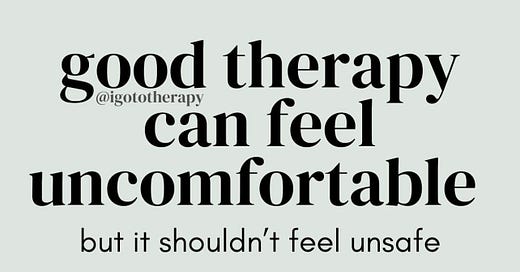When to stick it out in therapy...and when to go.
Hello friends!
The topic of today’s newsletter is very niched as I’m addressing the question of knowing when to stick it out in therapy (when it gets tough or when things are going well) or knowing when it’s time to terminate. If you’ve had a less than stellar experience with therapy in the past and you’ve considered working with someone again, this may be helpful to you.
Expectations
A lot of us start therapy with the expectation that sessions will generally feel good. Venting to friends can feel good and you might assume that having a safe person to talk to will be the same. But therapy isn’t venting to a friend. A therapeutic relationship is much different than a friendship and having that expectation from the start is important. Once trust is established (which can take awhile!) and you are in a good groove with your therapist, YES, therapy feels good. But often times sessions can feel heavy, draining and as if you’ve drudged up years worth of pain you didn’t know you had hidden in you. And then ten minutes later you have to get it together and get right back to your job or your kids asking for a snack as if nothing happened. It’s tough sometimes.
Some feelings about therapy that are totally normal:
-You get anxiety before a session
-You’re worried about how your therapist perceives you
-You’re embarrassed about something you’ve said
-You’re convinced you come across as a mess
-You want to stop because avoiding the hard stuff is easier and cheaper
Therapy is amazing because you learn how to understand yourself in a way that shows you that you make sense within the context of your own life. When a caring, neutral, professional who lives just outside of your life walks along side you, they can help you connect dots from your past to your present and show you how to use that connection and information in a new way that works better for you.
When To Stick It Out….
- You shared a lot and you regret it because you’ve never told someone those things before. This is what Brene Brown refers to as the ‘The Vulnerability Hangover’. It’s short lived and just on the other side of it is when you begin to change. You have to muddle through it though. (I even made a reel about the experience here!)
-You haven’t given it a fair shake. You are intentionally closed off or withholding. Maybe you’re not trying anything your therapist has suggested. If you really want it to help but you haven’t really given it a chance, you at least owe it to yourself to give it a short before stopping.
-You’re beginning to gain clarity about yourself, areas of your life that have been difficult and the connections you’re making are stirring up a lot of things for you. This is when therapy can feel laborious because you truly are doing the work of rewiring your brain. Its exhausting. But to overcome painful emotions you have to feel them. And it gets better, trust me. :)
-You’ve sorted out the main issue you started therapy for and you’re feeling much better. This is usually the time you stop seeing a therapist since life feels normal again. If you find yourself on a rollercoaster of emotions often, sticking it out when things are good is a strategic and proactive move. You know issues are going to pop up again and by keeping a relationship with a therapist open (you could just scale back to 1x a month) it makes it a lot easier to catch things before they spiral.
When to Quit…and find someone new.
No one likes to be a quitter and you might stick things out way longer than necessary. When you sign informed consent you can withdraw that consent at any time for any reason, but that’s much easier said than done for a lot of us. If you are experience any of these things below, your terminating therapy is 100% justified.
-You dread your sessions
-You are being told what to do and given specific advice
-When your confidentiality has been broken
-If you feel shamed, judged, or invalidated
-You keep repeating important details about your life that they don’t recall
-It’s the same thing over and over (i.e. they’re not helping you understand yourself or circumstances about your life in a different or more adaptive way)
- You’re not getting the time you pay for (i.e. they’re late, frequently cancelling/rescheduling, muting themselves or excusing themselves during session)
I hope this helped shed some light on the therapy experience and always feel free to send any questions my way!
Be well,
Melissa





